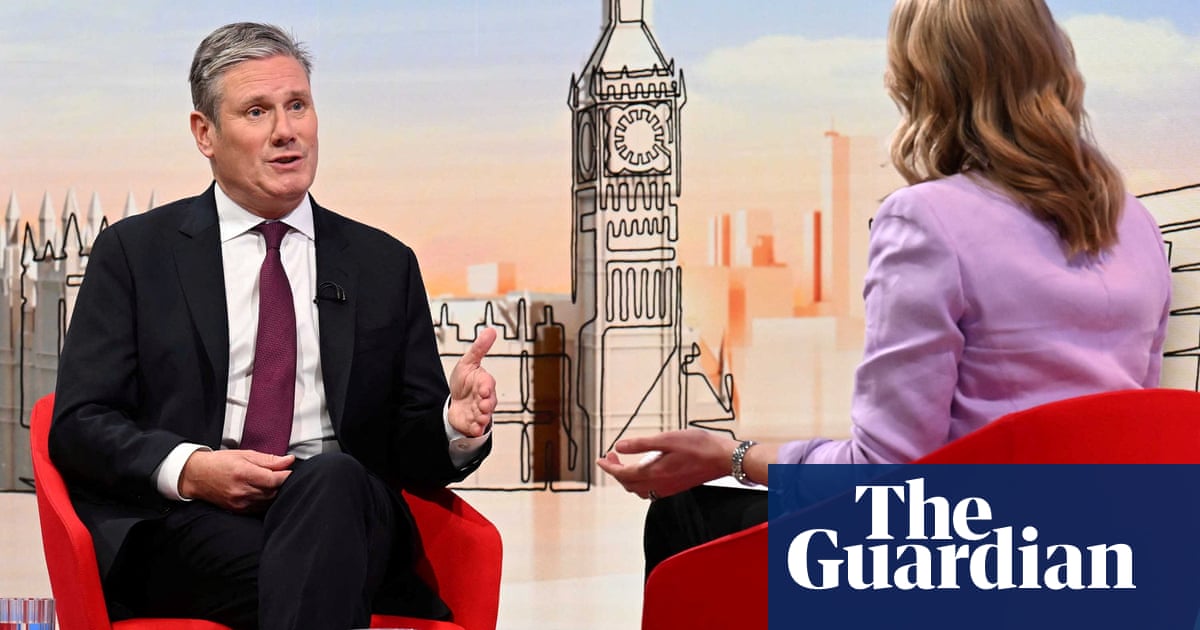
The news this week that Keir Starmer is parting ways with his director of communications, deputy director of communications, chief of staff, and his political director may bring an end to an unusual experiment in political communications that has been under way inside Labour. This innovative approach to messaging has attracted some attention for its lack of memorable policies (remember “British Recovery Bonds”?). But its main feature has been the unconventional insistence, from Starmer and his top team, that voters are right to shun Labour, who deserve to lose, in favour of the Tories, who are frankly doing such an excellent job that they will naturally keep winning.
The seeds of this approach were first sown by the mayor of London, Sadiq Khan, in the aftermath of the 2019 election defeat, when he said the British public got it right by voting Tory. The baton was soon picked up by the shadow foreign secretary, Lisa Nandy, who was keen to stress in her leadership campaign that Labour must “change or die”.
What started as a useful campaigning tool in the leadership elections – a bit of tough love for the party faithful – soon became a national communications strategy. Starmer himself parroted these sentiments in his first conference speech as Labour leader, saying the party he campaigned for as a prominent member of its shadow cabinet “deserved to lose the 2019 election”. These days, every subsequent setback brings new lines to explain why Labour should not get your vote: “Labour doesn’t listen to voters”; “Labour has lost the trust of working people”; “Labour are talking to ourselves instead of the country”; and on and on.
This over-the-top self-flagellation has its roots in the repeated insistence from frontbenchers that Labour needed first of all to “earn the right to be heard” – the belief that in order to win back Tory voters, Labour needed to analyse its own failings in a way that would resonate with hostile media and its audiences. As a result, prominent figures repeatedly imply that the 10 million people who voted for their party in 2017 and 2019 were mad to do so, or delusional for believing the manifestos that they backed could ever be delivered. (This attitude is all the more bemusing given the policies of its 2019 manifesto continue to poll extremely well and are finding more resonance in a context where political imaginations have been expanded by a pandemic.)
Instead of mobilising the energy of the party’s base and amalgamating some of the popular policy ideas – as Joe Biden has successfully done with the insurgent left in the Democratic party – Starmer has alienated Labour members and shied away from big political ideas, unless you count the announcement in February that he would soon launch a “policy blitz” that still hasn’t arrived. Even if one takes a cynical view of the motivations for Biden’s leftward shift, his agreement to pursue big-ticket policies like the Green New Deal secured the support of his leftwing primary opponents and helped unite the party behind him.
But for Starmer’s Labour there are no political gains to be made from appealing to progressive voters, who seem to be defecting in droves to the Greens and even the Liberal Democrats, or simply abstaining. There appears to be a reluctance in the leader’s office to test their crude tabloid narrative of why Labour “lost the working class” against the actual data.
According to figures from the latest round of the British Election Study, most low-income workers actually voted for Labour in 2019; if we leave aside retirees, the only income group where the Conservatives led Labour was those earning over £100k. Without the votes of pensioners, Labour would have led the Conservatives by three percentage points.
This is a different challenge than the 1990s, when New Labour identified and targeted what it saw as an aspirational section of the electorate that had been drawn to Thatcherism but which could be won over. Today’s version of Mondeo Man – a self-employed worker who is far from retirement age and “not rich” – is already likely to vote for Labour. So the party’s issue is not that it has “lost the working class” or failed to appeal to aspirational voters; it has lost pensioners whose material circumstances, alongside demographic shifts, have created an almost impenetrable Tory base.
The Tories do not insult their core supporters, but unapologetically set political priorities that they know will appeal to their key voters, and build political projects around those issues. Labour, on the other hand, has caused disillusionment among its base. Young voters are shifting their allegiance from Labour to the Greens, while the Lib Dem victory in Chesham and Amersham punctured Starmer’s claim that a “vaccine bounce” had made the Tories invincible.
Now the leadership risks losing the Batley and Spen byelection as Muslim voters also desert their longstanding political home. Party officials have only made matters worse by briefing Islamophobic lines to the rightwing press.
It is difficult to see a way back for Labour while their own MPs lack the political sense to draw on the party’s strengths while addressing its real weaknesses – rather than those conjured for internal political gains. Labour must rediscover its radical edge quickly or it will continue to lose support. Otherwise, despite all the criticism, Corbyn’s leadership will be seen as a post-2005 high-water mark for a party in perpetual decline.
Matt Zarb-Cousin is a former Labour media spokesman and director of Clean Up Gambling












